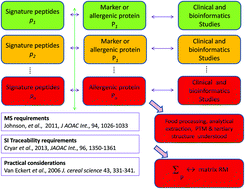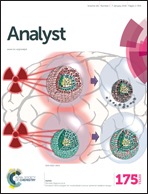Is food allergen analysis flawed? Health and supply chain risks and a proposed framework to address urgent analytical needs
Abstract
Food allergy is an increasing problem for those affected, their families or carers, the food industry and for regulators. The food supply chain is highly vulnerable to fraud involving food allergens, risking fatalities and severe reputational damage to the food industry. Many facets are being pursued to ameliorate the difficulties including better food labelling and the concept of thresholds of elicitation of allergy symptoms as risk management tools. These efforts depend to a high degree on the ability reliably to detect and quantify food allergens; yet all current analytical approaches exhibit severe deficiencies that jeopardise accurate results being produced particularly in terms of the risks of false positive and false negative reporting. If we fail to realise the promise of current risk assessment and risk management of food allergens through lack of the ability to measure food allergens reproducibly and with traceability to an international unit of measurement, the analytical community will have failed a significant societal challenge. Three distinct but interrelated areas of analytical work are urgently needed to address the substantial gaps identified: (a) a coordinated international programme for the production of properly characterised clinically relevant reference materials and calibrants for food allergen analysis; (b) an international programme to widen the scope of proteomics and genomics bioinformatics for the genera containing the major allergens to address problems in ELISA, MS and DNA methods; (c) the initiation of a coordinated international programme leading to reference methods for allergen proteins that provide results traceable to the SI. This article describes in more detail food allergy, the risks of inapplicable or flawed allergen analyses with examples and a proposed framework, including clinically relevant incurred allergen concentrations, to address the currently unmet and urgently required analytical requirements. Support for the above recommendations from food authorities, business organisations and National Measurement Institutes is important; however transparent international coordination is essential. Thus our recommendations are primarily addressed to the European Commission, the Health and Food Safety Directorate, DG Santé. A global multidisciplinary consortium is required to provide a curated suite of data including genomic and proteomic data on key allergenic food sources, made publically available on line.

- This article is part of the themed collections: Celebrating our 2018 prize and award winners, Celebrating the 2017 RSC Prize and Award Winners and Detecting food authenticity and integrity

 Please wait while we load your content...
Please wait while we load your content...